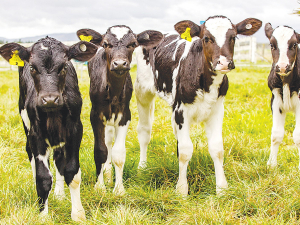Editorial: RMA reforms uproar
OPINION: The euphoria over the Government’s two new bills to replace the broken Resource Management Act is over.
 36% of the dairy calves born annually in New Zealand were killed as bobby calves compared with 19% in Australia and just 6% in the United States.
36% of the dairy calves born annually in New Zealand were killed as bobby calves compared with 19% in Australia and just 6% in the United States.
Dairy farmers in the upper North Island are worried they may need to unprofitably carry bobby calves through to higher weights if they can no longer be slaughtered.
Northland Federated Farmers president, Colin Hannah, says Moerewa is the only meatworks handling this class of stock in the north where around half of all herds calve in the autumn. Bobby calves can no longer be killed on farm under Fonterra regulations brought in at the start of the year and can't be trucked out of the area for slaughter due to transport time limits.
He told Auckland Federated Farmers' Conference in late April an estimated 135,000 bobby calves were born from Wellsford through to North Cape every year. Figures which he has worked out showed it could cost an average Northland dairy farm $40,000 if they had to take all their bobbies through to 100 kilograms. He made that calculation based on an average 400-cow farm with a 20% replacement rate. Around 40% of calves were estimated to be Friesian, 30% Kiwicross and 30% Jersey. Selling the calves at 100kg with returns from $350 - $500 a head would bring in $151,650 per farm but total rearing costs including labour, milk powder, meal and grass would reach $191,799.
Auckland Federated Farmers dairy chairperson, Rosemarie Costar said the public perception of bobby calves was very bad, and the dairy industry risked the loss of its social license.
"We need to somehow reduce the numbers we have but we don't have the answer."
 |
|---|
|
Northland Federated Farmers president, Colin Hannah. |
She said 36% of the dairy calves born annually in New Zealand were killed as bobby calves compared with 19% in Australia and just 6% in the United States. Only 5% of their meat went for veal in this country compared with 26% in Australia and 88% in the US.
Overseas dairy cooperatives, such as Arla in northern Europe, were now refusing to accept milk supply from farmers who sent bobby calves for slaughter.
"We can't be expected to carry these calves unprofitably," she said.
Meanwhile the Ministry for Primary Industries (MPI) has just published information on bobby calf mortality rates in the springs of 2020 and 2021 showing they remained consistent at around 0.04%. It issued 161 infringement notices in the 2020 spring calving season and 142 the next year with most of them relating to fitness for transport. In 2020, 131 infringements were issued to suppliers and 30 to transport operators, along with 22 written warnings to transport operators for carrying unfit calves. In 2021, 130 infringements were issued to suppliers and 12 to transport operators, along with 34 written warnigns.
Under MPI's On Farm Verification programme (OFV) in 2020, 348 dairy farms were audtited with 18 purposely selected due to calves dying or being condemned before slaughter and a further three were chosen based on low-level animal welfare concerns. No animal welfare issues were raised at any of the farms.
In 2021, 297 dairy farms were audited with just one case of inadequate care being provided to dairy cows and calves, which came from a lack of handover in knowledge and record keeping from the previous farm manager. A follow up visit found no problems.
MPI also runs a 'Follow the Trucks' programme in collaboration with the transport industry. The condition of the calves presented for transport was inspected with 181 farms visited in 2020 with nine different transporters. There were 19 issues found, mostly with calf loading facilities. There were also eight incidents of one or more unsuitable calves not loaded because they were unfit for transport. Three cases were referred to MPI Compliance for formal investigation.
In 2021, 172 farms were visited covering 11 different transporters. There were 11 loading facilities and eight loading ramps with issues, and 11 cases of calves not being loaded because they were unfit for transport.
Between July and November 2020, MPI received 32 complaints from the public regarding young calves. Most were unsubstantiated or were addressed through education. Four offences were detected, three written warnings were issued and one was resolved through education as the breach was minor.
In the same period the following year MPI received 33 complaints and again the majority were found to be unsubstantiated. Four offences were detected, one resolved with education, one written warning was given, one farmer is being prosecuted and one investigation is still under legal review.
Horticulture New Zealand (HortNZ) has added its perspective to numerous primary sector voices urging the Government to strengthen its draft legislation to replace the Resource Management Act (RMA).
The Commerce Commission has finalised new information disclosure requirements for local councils and water organisations that deliver water supply and wastewater services.
Beef + Lamb NZ (B+LNZ) is calling for significant changes to the Government’s reforms to the Resource Management Act (RMA).
NZPork says the Government needs to strengthen its proposed planning laws to ensure New Zealand's pig farmers can continue to produce pork.
Good news for kiwifruit growers - a record crop with forecast per hectare returns at record levels for all fruit categories for the 2025-26 season.
As guests gathered on what is known as the Speaker's Lawn - a beautifully manicured patch of grass behind the main buildings of Parliament - to mingle and enjoy a lamb chop to celebrate National Lamb Day, the mood was very much upbeat.